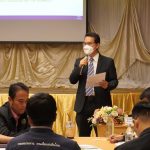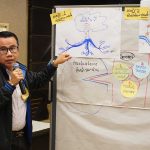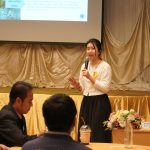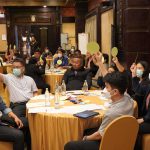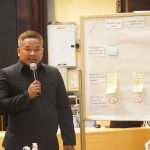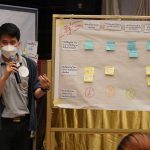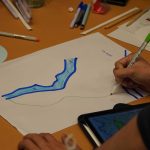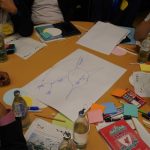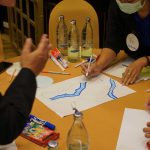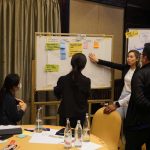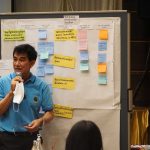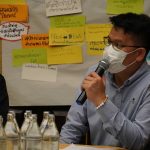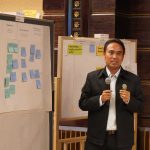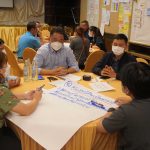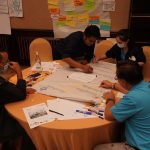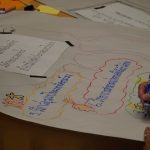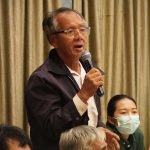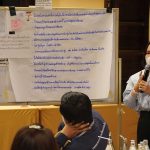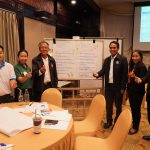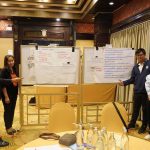Thailand has been categorised as a “high-risk” country, susceptible to the most severe impacts of climate change over the next 30 years. It is highly likely to face more frequent and intense droughts and floods, causing adverse effects on agriculture. Consequently, in the National Climate Change Adaptation Plan for the year 2018, managing water resource in responding to drought and severe floods were designated as urgent national priorities to increase the country’s resilience to natural disasters. In pursuit of this goal, the project “Enhancing Climate Resilience in Thailand through Effective Water Management and Sustainable Agriculture: E-WMSA” was established and funded by the Green Climate Fund (GCF). This initiative is implemented through the collaboration of the United Nations Development Programme (UNDP) and the Department of Irrigation under the Ministry of Agriculture and Cooperatives (MOAC).

The UNDP has appointed GIZ to provide support to the Department of Irrigation, relevant local authorities, and communities in the Yom and Nan River basins. The aim is to improve their preparedness for severe droughts and floods by enhancing and increasing the efficiency of gray infrastructure using Ecosystem-based Adaptation (EbA) approaches, aligning with water resource management policies and planning in the provinces of Phitsanulok, Sukhothai, and Uttaradit. To achieve the project’s objectives, it is crucial to build the capacity of stakeholders involved in the Yom and Nan basin. Therefore, GIZ and the Department of Irrigation have organised a “Training Need Analysis (TNA) Workshop” on July 11-12, 2023, in Phitsanulok.
The workshop was attended by participants from various backgrounds, including the National and Provincial Levels of the Royal Irrigation Department, the River Basin Committee, relevant local departments, educational institutions, non-governmental organisations, the National and Provincial Levels of the Department of Water Resources, as well as departments in the Ministry of Natural Resources and Environment responsible for the local level.
The objectives of this workshop are as follows:
- exchange information on effectiveness of current water resource management and collaboration within the Yom and Nana River basins
- collectively analyse opportunities and potentials for strengthening the efficiency of grey infrastructure by an application of Ecosystem-based Adaptation (EbA) measures, which will help to improve water resource management against extreme impacts of climate change within the local context,
- collect recommendations on the roles and responsibilities of each relevant agencies in participating and driving an implementation of EbA measures in the river basins,
- foster understanding on the project overview, workplan, and key activities regarding to improve water management efficiency by complementing the grey infrastructures with EbA measures, as well as capacity development and training programs that align with interests and needs of our target audience.

Chonlathep Thatree, Director of Irrigation Office 3, Department of Irrigation, stated, “Water management that solely relying on the gray infrastructure might not be sufficient to tackle future climate change challenges. Thus, the E-WMSA project aims to pioneer an improvement of water resource management in the Yom and Nan River basins by complementing the grey infrastructure with EbA measures or so-called green infrastructure. This will prepare us to confront the severe floods and droughts that may occur. The project’s success depends on the support and collaboration of all relevant sectors. Hence, this meeting is a crucial starting point for fostering our excellent cooperation through knowledge exchange and reflecting on the potential and needs of relevant agencies in designing effective capacity development and training programmes.” The two-day workshop created a conducive learning environment and provided opportunities for participants to actively engage through various activities on different topics. The topics covered during the workshop include presentations on the current situation and future trends of policies, directions, plans, and strategies related to improving water resource management to increase the country’s resilience against the impacts of climate change, utilising ecosystem-based adaptation measures. The presentations also encompassed an overview of the project’s vision, strategy, and operational framework, with a focus on the outcomes relevant to the activities regarding to EbA approach.

Besides that, subgroup activities were also conducted to encourage participants to exchange ideas on various issues. These included “envisioning dream project” resulting from the improvement of water resource management through the implementation of Ecosystem-based Adaptation (EbA) measures, whereby participants will pool their thoughts to outline a three-year project plan. Moreover, there was sub-group activity involving analyses of the project’s potential gaps and areas requiring enhancement to ensure the successful implementation of the plan. These activities present an opportunity for attendees to provide suggestions and opinions to effectively design measures for capacity development.
Throughout the two-day meeting, participants gained a shared understanding on various matters, including:
- Recognising the current state of water resource management and how to increase resilience to climate change impacts through EbA-based infrastructure improvements.
- Establishing connections between the ideas presented for water resource management improvements and ongoing basin-level activities, understanding the overall scope of the project and the roles and support of each sector.
- Providing opportunities for participants to reflect on perspectives and opinions regarding capacity development and training for personnel and organisations involved to ensure efficiency and effectiveness aligned with the project’s goals and support plans.
- Promoting inclusiveness in project implementation by ensuring the involvement and agreement of all relevant sectors at the preliminary stage.
Ultimately, the outcomes of this operational meeting will be used to future training activities that meet the needs of the stakeholders, ensuring an efficient and effective project development that fosters active involvement and valuable input from all participants. ■








